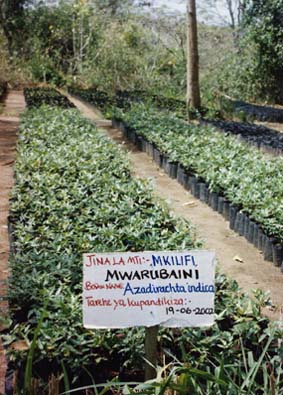Refugees have been entirely depending on the environment for all sources of energy and construction materials.
Also for crop production the Somali refugees use the allocated land for cultivation. Until August 2003 sixty (60) hectares
have already been resurveyed. One hectare per refugee family will be allocate in September 2003. There are already families producing Amaranthus,
Cabbages, Onions, Tomatoes, Chinese cabbages, Carrots and Okra.
Reducing more environment damage and destruction, the organization has put in place some intervention measures under environmental management sector. These strategies follow under three working components namely forest/environmental rehabilitation, environmental education which have been given the most consideration.
Restoration of damaged areas has been undertaken by the sector through advising the refugees and
local communities on the wise use of the available and scarce resources. Special attention has been given to
the land under cultivation and neighboring forests. Nursery establishment and management activities executed by the sector
have been given priority. The seedlings raise from the nursery normally are planted in the vicinity of and outside the village throughout the
planting seasons. Individual people, both local and Tanzanians as well
as various institutions like Chogo primary school and churches have benefited with the seedlings.
For better forest implementation of the forest protection activities the unit has employed forest guards whom conduct daily patrols and home visits
in the village. The intervention method aim at providing and advising people
on the wise use of the available resources and at the same time intervening on environmental illegal activities. In order to reduce too much forest
stress and better controlling purposes some forest areas have been set aside as tree harvesting sites. Under the guidance of the workers, refugees are shown
on how and where to harvest trees for construction purposes. Furthermore, plans are underway to train the Somali refugees on construction of their houses using
mud bricks rather that depending entirely on the forest for construction materials.
Collection of firewood is done all over the village areas, basing on the fast that
collectors have to pick up ground dry rather than green woods. Fuel - wood energy
servings have been improved by the use of modern mud cooking stoves. The technology
was already introduced in the former Mkuyu camp in January 2001. The energy animators
educate the refugees in constructing and using the technology including its associated cooking practices.
Achievement
Constraints
Lack of enough awareness on environmental management to refugees and local people, most of them do not incorporate environmental issues into their
ordinary activities especially during farm preparation and fuel energy uses. Bush fire set during farm preparation and poor tending of the provided and
planted trees seedling where most of the seedling end up dying and damaged by animals.


